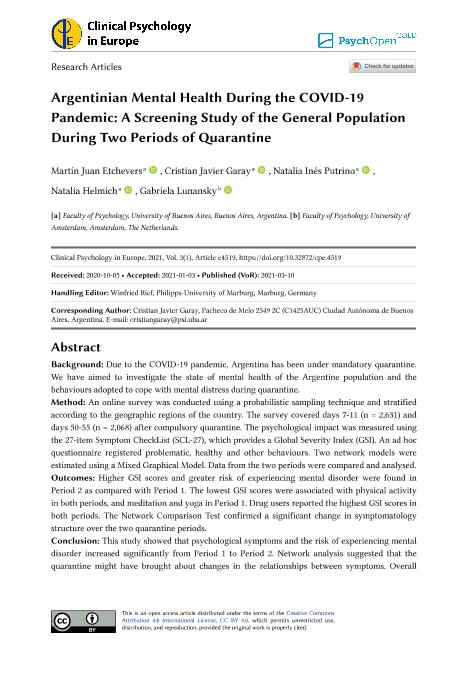Mostrar el registro sencillo del ítem
dc.contributor.author
Etchevers, Martín Juan

dc.contributor.author
Garay, Cristian Javier

dc.contributor.author
Putrino, Natalia Inés

dc.contributor.author
Helmich, Natalia
dc.contributor.author
Lunansky, Gabriela
dc.date.available
2022-07-05T14:32:51Z
dc.date.issued
2021-03
dc.identifier.citation
Etchevers, Martín Juan; Garay, Cristian Javier; Putrino, Natalia Inés; Helmich, Natalia; Lunansky, Gabriela; Argentinian mental health during the covid-19 pandemic: A screening study of the general population during two periods of quarantine; PsychOpen; Clinical Psychology in Europe; 3; 1; 3-2021; 1-17
dc.identifier.issn
2625-3410
dc.identifier.uri
http://hdl.handle.net/11336/161297
dc.description.abstract
Background: Due to the COVID-19 pandemic, Argentina has been under mandatory quarantine. We have aimed to investigate the state of mental health of the Argentine population and the behaviours adopted to cope with mental distress during quarantine. Method: An online survey was conducted using a probabilistic sampling technique and stratifiedaccording to the geographic regions of the country. The survey covered days 7-11 (n = 2,631) and days 50-55 (n = 2,068) after compulsory quarantine. The psychological impact was measured using the 27-item Symptom CheckList (SCL-27), which provides a Global Severity Index (GSI). An ad hoc questionnaire registered problematic, healthy and other behaviours. Two network models were estimated using a Mixed Graphical Model. Data from the two periods were compared and analysed. Outcomes: Higher GSI scores and greater risk of experiencing mental disorder were found in Period 2 as compared with Period 1. The lowest GSI scores were associated with physical activity in both periods, and meditation and yoga in Period 1. Drug users reported the highest GSI scores in both periods. The Network Comparison Test confirmeda significantchange in symptomatology structure over the two quarantine periods. Conclusion: This study showed that psychological symptoms and the risk of experiencing mental disorder increased significantlyfrom Period 1 to Period 2. Network analysis suggested that the quarantine might have brought about changes in the relationships between symptoms. Overall results revealed the relevance of mental health and the need to take mental health actions upon imposing quarantine during the current COVID-19 pandemic.
dc.format
application/pdf
dc.language.iso
eng
dc.publisher
PsychOpen
dc.rights
info:eu-repo/semantics/openAccess
dc.rights.uri
https://creativecommons.org/licenses/by/2.5/ar/
dc.subject
ARGENTINA
dc.subject
PANDEMIC
dc.subject
MENTAL HEALTH
dc.subject
QUARANTINE
dc.subject
COVID-19
dc.subject.classification
Otras Psicología

dc.subject.classification
Psicología

dc.subject.classification
CIENCIAS SOCIALES

dc.title
Argentinian mental health during the covid-19 pandemic: A screening study of the general population during two periods of quarantine
dc.type
info:eu-repo/semantics/article
dc.type
info:ar-repo/semantics/artículo
dc.type
info:eu-repo/semantics/publishedVersion
dc.date.updated
2022-07-04T20:03:04Z
dc.journal.volume
3
dc.journal.number
1
dc.journal.pagination
1-17
dc.journal.pais
Alemania

dc.description.fil
Fil: Etchevers, Martín Juan. Universidad de Buenos Aires; Argentina
dc.description.fil
Fil: Garay, Cristian Javier. Universidad de Buenos Aires; Argentina
dc.description.fil
Fil: Putrino, Natalia Inés. Universidad de Buenos Aires; Argentina. Consejo Nacional de Investigaciones Científicas y Técnicas. Oficina de Coordinación Administrativa Saavedra 15. Centro Interdisciplinario de Investigaciones en Psicología Matemática y Experimental Dr. Horacio J. A. Rimoldi; Argentina
dc.description.fil
Fil: Helmich, Natalia. Universidad de Buenos Aires; Argentina
dc.description.fil
Fil: Lunansky, Gabriela. University of Amsterdam; Países Bajos
dc.journal.title
Clinical Psychology in Europe
dc.relation.alternativeid
info:eu-repo/semantics/altIdentifier/doi/http://dx.doi.org/10.32872/cpe.4519
dc.relation.alternativeid
info:eu-repo/semantics/altIdentifier/url/https://cpe.psychopen.eu/index.php/cpe/article/view/4519
Archivos asociados
